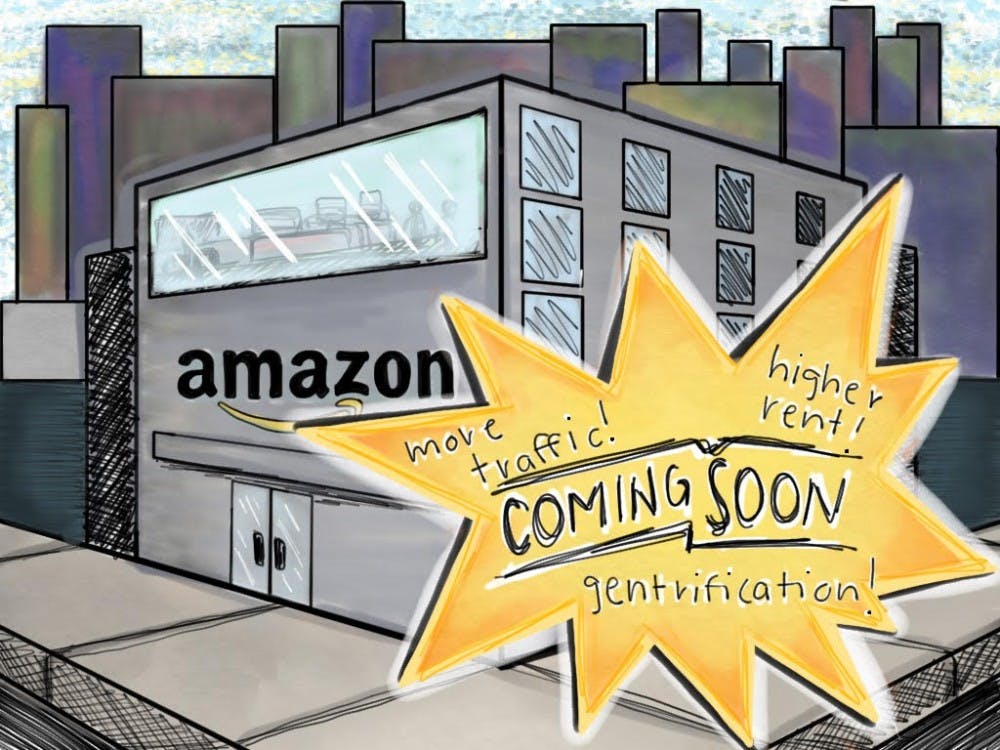This past week, after great anticipation, Amazon revealed that it would split its second headquarters between two cities, New York City and Arlington, Virginia. Cities across North America, 238 in total, have tried to prove themselves in attempts to lure the multi-billion dollar company, producing rather cringe-worthy promotion videos, offering up to $7 billion in tax incentives and pulling off wild stunts to attract Amazon’s eye.
Amazon's ideal city included a low cost of living, a population of a million people or more, incentives, access to mass transit and a nearby international airport.
Indiana's own city of Indianapolis made it to the top-20 finalist list of candidate cities but did not receive the prize.
Although most of these cities have lost, Amazon has nevertheless gained from all of them. What has it gained? Data.
As CBS News reports, the 238 cities’ bids “included exhaustive data about nearly every aspect of civic life,” including infrastructure projects, demographics and more. The data from Boston, for example, even involved how many people walked to work and how many live by parks.
Since Amazon depends on customer data for its sales, all of this new information will be a huge asset to the company. Also, the data will come in handy if it tries to expand again in the future.
More immediately, as Amazon begins work in Virginia and New York, we should wonder what sort of effect it will have on these cities, and whether that will be an overall net gain or a net loss.
Some residents are looking forward to the rise in housing costs, especially those who just bought a house recently. Others believe that the cities will experience effects similar to what has been going on at the company’s headquarters in Seattle.
A lot of debate continues on how much help and how much pain Amazon is for Seattle. In a positive light, the company has invested heavily in an area of the city that was previously run-down, South Lake Union, which is now bustling with glassy offices and hipster employees with name tags.
According to the Seattle Times, the area has experienced $668 million in infrastructure improvements, one-sixth of which was from private investment, i.e. Amazon and other companies. In addition, it has “contributed $30 billion to the local economy” as the Washington Post reports.
Amazon “now occupies a mind-boggling 19 percent of all prime office space in the city,” as the Seattle Times writes. This is more than the combined office space of the next 40 biggest employers in Seattle.
“In most big cities,” writes the Times, “the top employer has less than 5 percent of local office space.”
Amazon’s growth has caused a population influx, as 57 people a day were arriving to the city throughout 2016, and this explosion has created a huge demand for new housing. It seems the city cannot build fast enough. Despite construction at a breakneck pace, the homeless population has grown. There is debate on to what extent this is attributable to Amazon, but what is certain is that the company has not always wanted to help out with the problem.
After all, Amazon fought a Seattle tax hike on large employers that would have generated $48 million to address the homeless problem. But at the same time, Amazon will provide half of a six-story office building to house homeless families.
One thing is certain. Seattle is not building fast enough or providing enough relief to the homeless, and is suffering as a result. As this is due at least in part to Amazon’s presence, the cities of Arlington and New York City ought to view this as a warning.
Therefore, they need to prepare for the probable population influxes that they will experience. This means improving their infrastructure to reduce traffic, building a lot more housing to keep the prices from rising too quickly and keeping close feedback with their citizens to make sure their needs are being met.




